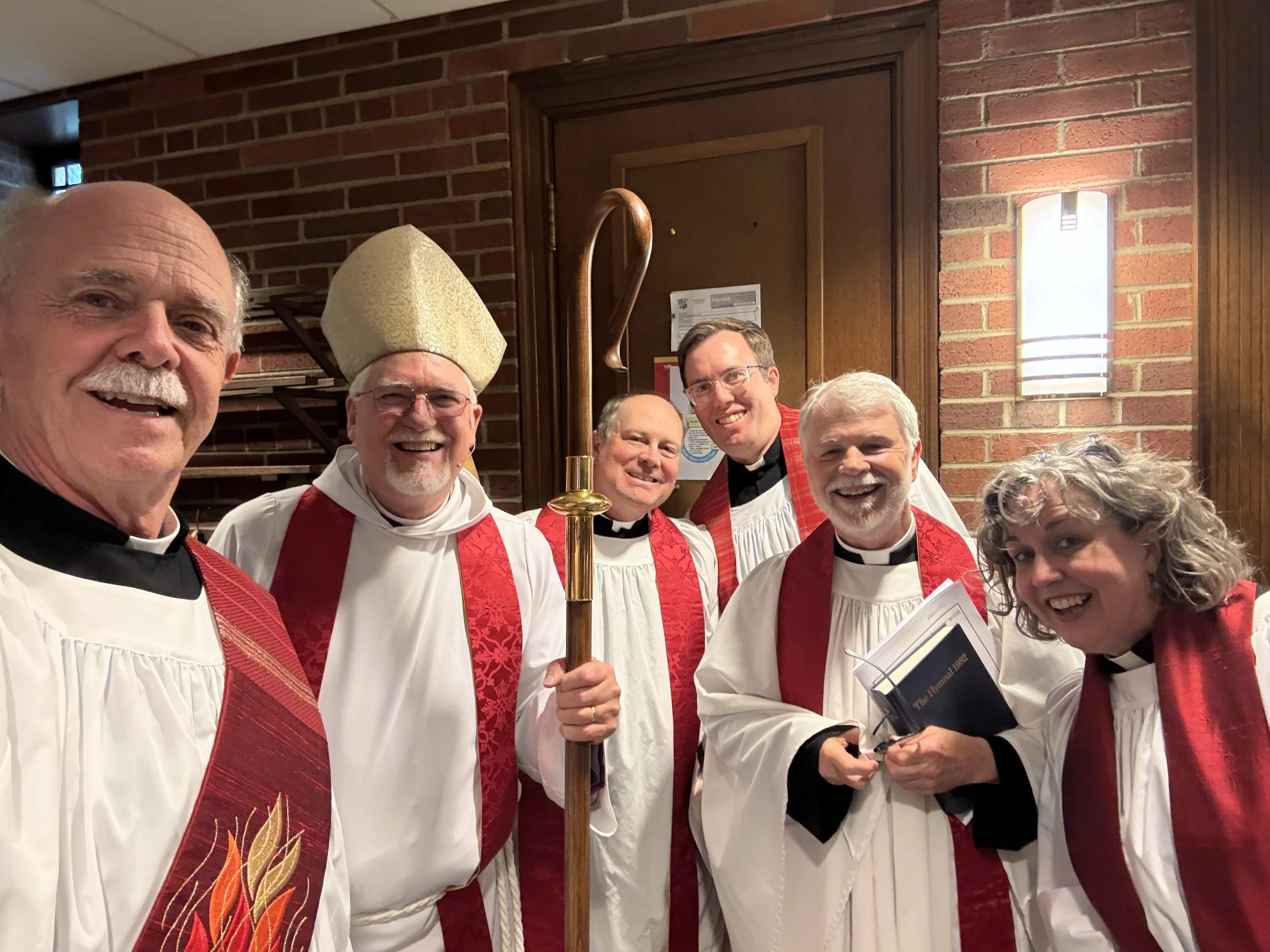So… What Is a Deacon, Anyway?
And How Do You Become One in the Episcopal Diocese of Wisconsin?
Let’s start with the stole. Yes, the diagonal one. It is different, but more than that, it is a special call.
Deacons are ordained ministers in the Episcopal Church, and their whole mission is to bring God to the people, and the people to God by standing in the gap—between the altar and the world, bringing the needs of the world to the church and the church to the needs of the world.
They’re the ones proclaiming the Gospel with fire and packing hygiene kits with gentleness. They pray at hospital bedsides and testify at city council meetings for those with no voice . They’re the Church’s eyes and ears on the margins—and they help the whole Body of Christ wake up to what matters.
When a priest says, “Come, be fed,”
a deacon says, “Go, be sent.”
When the Church asks, “What next?”
a deacon says, “Here’s where”
If you’ve ever felt like church should be out there more—at protests, at shelters, in food lines—then maybe the Spirit has prepared you for something and nudging you toward the diaconate.
So... How Do You Become a Deacon?
Let’s say you’ve felt that holy nudge. Maybe it started quietly—packing bags at the pantry, sitting with someone in grief, offering your voice for the voiceless. Maybe someone said it to you (awkwardly, lovingly), “You’d make a good deacon.” Maybe, you feel called to be a visible sign of Christ working in the world in a new way.
So... now what?
1. Start with Prayer and Conversation
Deacon Bramwell serves in the Northwoods Region. Also pictured are Mother Nozy and Verger Monty.
Your journey begins with you and God. And eventually, with you and your priest. Talk it out. Bring your questions. No polished answers required.
If you're asking, “who am I called to be?” that’s already the beginning of discernment.
2. Reach Out to the Commission on Ministry (COM)
Visit diowis.org/com and poke around. You’ll find forms, outlines, and contact info for people who are literally here to help you figure this out. Email them. Ask questions. You're not committing to anything yet—just stepping toward clarity.
The COM walks with everyone discerning a call to ordained ministry. They’re wise. They’re kind. They’re not scary. Promise.
Sometimes that discernment is discerning that it isn’t the call for you, and that’s a success!
3. Gather a Regional Discernment Committee (RDC)
With support from your priest and the COM, you’ll be matched with a Regional Discernment Committee (RDC)—a group of folks to accompany you in this holy wondering and get down to the root of exploring the call, praying for you and more.
They’ll meet with you over five sessions (usually over several weeks to months) to explore your call, reflect on your gifts, and ask big questions like:
What breaks your heart?
Where do you see God calling you?
Do you know what you’re getting into?
(Answer key: not entirely. And that’s okay.)
Deacon REGS serves DioWis through End of Life Planning Sessions - each one of us has a unique call by God!
4. Attend the Ministry Discernment Weekend
After the RDC submits their final report, you’ll join others from across the diocese—folks discerning priesthood, the diaconate, or deeper lay leadership. Together, you’ll worship, laugh, learn, reflect, and maybe cry a little in holy community.
Also? Snacks. Always snacks.
5. Apply to the Diocese
During and after your RDC, assuming your priest believes the call is real and ripening, you’ll apply have some Paperwork
That includes:
Essays about your journey and theology
Recommendations from your parish
A background check
Psychological and medical evaluations
This isn’t about proving perfection—it’s about showing readiness, resilience, and spiritual maturity. We’re not ordaining superheroes. We’re walking with humans who love God and love the world enough to serve it.
6. Formation: Becoming the Deacon You’re Called to Become
Postulancy → Candidacy → Ordination
These are the stepping stones.
Postulant: The Church says “Yes—we see what you see. Let’s walk together.”
Candidate: You’re deep into formation and discernment.
Deacon: With the bishop’s blessing and a whole lot of joy, you’re ordained to the Sacred Order of Deacons.
You’ll participate in diocesan formation programs built specifically for deacons. It’s part-time, contextual, and deeply rooted in service.
You’ll study theology, scripture, pastoral care, ethics, and how to speak truth with compassion. You’ll also learn:
How to serve liturgically and prophetically
How to preach without pretending
How to stay grounded when the work is hard
7. Then You Serve
Our Archdeacon is always willing to chat!
You’ll get a stole that goes across your shoulder and a new title, sure—but more importantly, you get a renewed charge: You won’t disappear into churchland. Deacons live on the edges and in-between places: in prisons, clinics, kitchens, recovery meetings, and community gardens. Wherever Christ is needed, that’s where you show up. You bring Christ to the world and the world to Christ.
And on Sunday mornings, you’ll lift your voice and say:
“Go in peace, to love and serve the Lord.”
And you’ll mean it with your whole soul.
Curious? Wondering? Terrified but intrigued?
Visit diowis.org/com.
Talk to your priest.
Talk to a deacon or the archdeacon (bill@diowis.org).
Reach out to the COM.
Ask the hard questions.
Because if that holy nudge won’t go away? You owe it to yourself—and to God—to follow it a little further.
We’re here when you’re ready. And we can’t wait to meet you.




